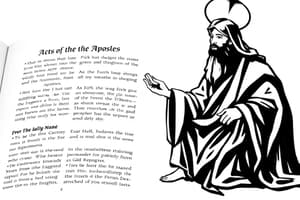Podcast
Questions and Answers
According to 1 Corinthians 4:17 and 2 Timothy 2:2, what is the process of teaching and entrusting doctrine?
According to 1 Corinthians 4:17 and 2 Timothy 2:2, what is the process of teaching and entrusting doctrine?
- Apostle Paul, as the primary teacher, directly manages the doctrinal teaching in all churches without delegation.
- Timothy was primarily responsible for developing new doctrines, which were then reviewed and approved by Paul for dissemination across churches.
- Apostles are the sole teachers in every church, with Timothy assisting in administrative roles, not doctrinal instruction.
- Apostles like Paul teach and then entrust the teaching to others, such as Timothy, who then entrust it to others like Titus and Epaphras, ensuring doctrinal continuity. (correct)
Considering 2 Peter 1:19 and 1 Corinthians 4:6, how do apostolic doctrines relate to existing scriptures and personal interpretations?
Considering 2 Peter 1:19 and 1 Corinthians 4:6, how do apostolic doctrines relate to existing scriptures and personal interpretations?
- Apostolic teachings allow for going beyond the written word to apply scriptures to modern life. This does not mean they contradict scripture; scripture is simply a guide.
- Apostolic doctrines should strictly adhere to the written word, not going beyond it, and should align with prior prophecies without contradiction, ensuring biblical consistency. (correct)
- Apostolic doctrines should be interpreted by each individual, as long as they align with the core principles of love and faith to avoid remaining stagnant in the faith.
- Apostolic doctrines often introduce new interpretations that supersede or correct earlier prophetic writings, providing a more relevant understanding for contemporary issues.
According to Jude 1:3, 1 Corinthians 15:1, Acts 2:42, and Philippians 4:9, how should the church respond to apostolic doctrines?
According to Jude 1:3, 1 Corinthians 15:1, Acts 2:42, and Philippians 4:9, how should the church respond to apostolic doctrines?
- The church should selectively adopt aspects of apostolic doctrine that are relevant to current social justice issues, disregarding those that conflict with modern sensibilities.
- Churches should critically evaluate apostolic doctrines, accepting them only if they align with contemporary cultural values and promote inclusivity, adapting them as necessary.
- The church should primarily focus on the moral teachings of the apostles, which are timeless principles that should evolve with and adapt to modern ethics.
- Churches should actively defend and remain devoted to the doctrines received from the apostles, integrating them into their practices and daily lives to maintain apostolic tradition. (correct)
Based on 1 John 4:1-6 and 2 Corinthians 4:4, what is the critical importance of discerning the spirit behind a message?
Based on 1 John 4:1-6 and 2 Corinthians 4:4, what is the critical importance of discerning the spirit behind a message?
According to John 3:34, 1 Corinthians 2:12, 15:1, 3, and Jude 1:3, what role do apostles and their successors play in conveying divine messages?
According to John 3:34, 1 Corinthians 2:12, 15:1, 3, and Jude 1:3, what role do apostles and their successors play in conveying divine messages?
In light of 2 John 1:9-10, how should believers approach those who present unfamiliar doctrines?
In light of 2 John 1:9-10, how should believers approach those who present unfamiliar doctrines?
Considering Jeremiah 23:26 and Galatians 1:12, what distinguishes apostolic doctrines from non-apostolic ones in terms of their origin?
Considering Jeremiah 23:26 and Galatians 1:12, what distinguishes apostolic doctrines from non-apostolic ones in terms of their origin?
Based on Colossians 2:8 and Matthew 28:20, why is adherence to apostolic doctrine crucial amid philosophical influences?
Based on Colossians 2:8 and Matthew 28:20, why is adherence to apostolic doctrine crucial amid philosophical influences?
In reference to 1 Corinthians 9:1-2 and Hebrews 4:12, how does one discern the authenticity and impact of apostolic teaching?
In reference to 1 Corinthians 9:1-2 and Hebrews 4:12, how does one discern the authenticity and impact of apostolic teaching?
Considering 2 Timothy 1:13-14, what action is essential for preserving apostolic doctrine and guarding against its corruption?
Considering 2 Timothy 1:13-14, what action is essential for preserving apostolic doctrine and guarding against its corruption?
Why is adherence to apostolic doctrine considered fundamentally important in the context of Christian belief?
Why is adherence to apostolic doctrine considered fundamentally important in the context of Christian belief?
What is the significance of an apostle being 'sent' rather than self-appointed in the context of preaching and teaching?
What is the significance of an apostle being 'sent' rather than self-appointed in the context of preaching and teaching?
According to the information, what role do apostles play in understanding God and reconciling people, as highlighted in 2 Corinthians 5:20?
According to the information, what role do apostles play in understanding God and reconciling people, as highlighted in 2 Corinthians 5:20?
How does the concept of 'revelation' relate to the formation and understanding of apostolic doctrine?
How does the concept of 'revelation' relate to the formation and understanding of apostolic doctrine?
What implications arise if a preacher or teacher in the church has not been 'sent' or appointed, even if they possess knowledge, wisdom, or present themselves well?
What implications arise if a preacher or teacher in the church has not been 'sent' or appointed, even if they possess knowledge, wisdom, or present themselves well?
In what ways does understanding Paul's role as an apostle and ambassador for Christ enhance one's comprehension of apostolic doctrine?
In what ways does understanding Paul's role as an apostle and ambassador for Christ enhance one's comprehension of apostolic doctrine?
Considering the traits of Apostolic Doctrine, how might a contemporary theological claim be evaluated to determine its alignment with Apostolic teachings?
Considering the traits of Apostolic Doctrine, how might a contemporary theological claim be evaluated to determine its alignment with Apostolic teachings?
Given the emphasis on apostles being 'sent' by Jesus Christ, how should a modern Christian approach claims of apostleship made outside traditional religious hierarchies?
Given the emphasis on apostles being 'sent' by Jesus Christ, how should a modern Christian approach claims of apostleship made outside traditional religious hierarchies?
Flashcards
Apostle
Apostle
One sent by Jesus Christ, not by any human agency; an ambassador for Christ.
Apostolic Definition
Apostolic Definition
Relating to the teachings and person of Jesus Christ and His apostles.
First Apostle
First Apostle
Jesus Christ, sent by God the Father to represent Him on Earth.
Apostolic Doctrine Quality
Apostolic Doctrine Quality
Signup and view all the flashcards
Apostles' Role
Apostles' Role
Signup and view all the flashcards
God's Use of Apostles
God's Use of Apostles
Signup and view all the flashcards
Source of Apostolic Doctrine
Source of Apostolic Doctrine
Signup and view all the flashcards
Apostles as teachers
Apostles as teachers
Signup and view all the flashcards
Biblical Alignment
Biblical Alignment
Signup and view all the flashcards
Upholding Doctrine
Upholding Doctrine
Signup and view all the flashcards
Testing the Spirit
Testing the Spirit
Signup and view all the flashcards
Spirit of Falsehood
Spirit of Falsehood
Signup and view all the flashcards
Source of Message
Source of Message
Signup and view all the flashcards
Passing on Doctrines
Passing on Doctrines
Signup and view all the flashcards
Source of False Doctrines
Source of False Doctrines
Signup and view all the flashcards
Paul's Gospel Source
Paul's Gospel Source
Signup and view all the flashcards
Checking the Fruit
Checking the Fruit
Signup and view all the flashcards
Study Notes
- "Apostle" comes from the Greek word "apostolos," meaning one who is sent.
- An apostle is specifically sent by Jesus Christ, not by any human entity.
- Paul emphasizes in Galatians 1:1 that he was sent by Jesus Christ and God the Father.
- In modern terms, an apostle can be understood as an ambassador, as Paul describes himself in 2 Corinthians 5:20.
What "Apostolic" Means
- It refers to the person and teachings of Jesus Christ.
- It refers to the teachings and customs of Jesus Christ's apostles, both past and present.
- Jesus Christ was the first apostle, sent by God the Father, as noted in Hebrews 3:1.
Why Doctrines Should Be Apostolic
- Jesus Christ, as the first apostle, taught correctly about God.
- Apostolic doctrine aligns with the truth of Jesus Christ, as only Jesus knows the Father (Matthew 11:27).
- Jesus' teachings originated from the Father's will (John 7:16-17).
- Apostles are appointed by Jesus to preach on His behalf.
- Romans 10:15 stresses the importance of being sent before preaching.
- Only those sent by God have the authority to preach, and they speak the words of God (John 3:34).
- God uses apostles to help us understand Him, as highlighted in 2 Corinthians 5:20, where Paul is described as an ambassador of Christ.
Four Traits of Apostolic Doctrine
- They are revealed by God:
- Peter's understanding of Jesus Christ's identity came through revelation from God the Father (Matthew 16:17, 11:27).
- Paul received the gospel through a revelation of Jesus Christ (Galatians 1:11-12).
- Doctrines are passed on.
- They are taught by apostles in the church:
- Apostles, not just knowledgeable individuals, are designated teachers in the church (1 Corinthians 4:17).
- Timothy was sent to teach, and he was tasked with entrusting others the task of teaching to others (2 Timothy 2:2).
- They agree verbatim and in spirit with the Bible:
- Apostolic doctrines must align with the Bible's words and spirit.
- John 6:63 emphasizes that God's words are full of spirit and life.
- 2 Peter 1:19 notes that Peter's teachings build upon the word of prophecy from the Old Testament.
- True apostolic doctrines and teachings are completely biblical, without going beyond what is written (1 Corinthians 4:6).
- They are followed by the church as a whole:
- Believers should contend for the teachings of Christ (Jude 1:3).
- People should stand firm in the doctrine they received (1 Corinthians 15:1).
- The early church was devoted to the apostles' teachings and doctrines (Acts 2:42).
- Believers should practice what they have heard and make apostolic living a routine (Philippians 4:9).
Three Ways to Differentiate Apostolic Doctrines from Unapostolic Doctrines
- Check the spirit behind the message:
- Discern whether the spirit is from God (1 John 4:1-6).
- Falsehood carries a spirit of deception (2 Corinthians 4:4).
- The Holy Spirit reveals truth (1 Corinthians 2:12).
- Determine if the person delivering the message is an apostle or a companion of the apostle (John 3:34)
- Check the source of their message:
- Non-apostolic doctrines originate from men, not from God (Jeremiah 23:26).
- Apostolic doctrine is received from God, and not from men (Galatians 1:12).
- Teaching is necessary (Matthew 28:20).
- The philosophies of men are not founded on Christ (Colossians 2:8).
- Check the fruit of the message:
- Look at the results and impact of the message.
- 1 Corinthians 9:1-2 highlights that believers are the result of apostolic doctrine.
- The word of God can be like a sword (Hebrews 4:12).
Studying That Suits You
Use AI to generate personalized quizzes and flashcards to suit your learning preferences.




